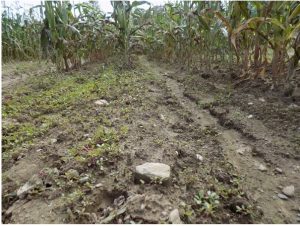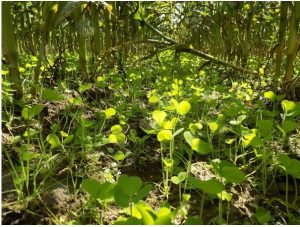County Highlights
Maine Food System
Expanded Food and Nutrition Education Program
The Expanded Food and Nutrition Education Program (EFNEP) improves the health and well-being of limited-income families and youth by positively impacting their skills in nutrition, food purchasing, food safety, and food preparation. EFNEP Community Education Assistants (CEAs) involve participants in activities such as cooking, menu planning, and food budgeting to help them gain knowledge and skills to create lasting change. EFNEP CEAs have provided educational programs to a variety of community groups throughout Androscoggin and Sagadahoc counties in the past, including public schools, vocational technology schools, Summer Food Service program sites, the Boys & Girls Club, Maine Immigrant and Refugee Services, various group home settings, local housing authorities, local food pantries, as well as in individuals’ homes.
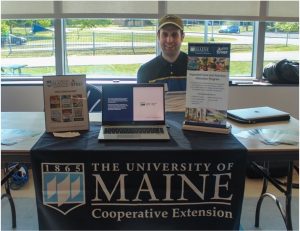
With the need for more support following the Covid-19 pandemic, EFNEP hired a new Nutrition Education Professional/Supervisor position at the beginning of November 2020. With his office based out of the Androscoggin/Sagadahoc counties office, Alex Bosse has been an integral part of the EFNEP team, supervising 3-5 CEAs in southern Maine, helping to support CEAs statewide in early 2021 by adapting existing grades K-2, 3-5, and 6-8 curricula to be delivered remotely, providing support and coaching for monthly statewide Fedcap nutrition education classes throughout the year, collaboration and mentorship with 4-H staff and EFNEP CEAs to deliver nutrition education classes for the 4-H Summer Learning Series in 2021, as well as identifying and adapting middle school and high school curricula to be used to develop trainings and materials for implementation by EFNEP CEAs statewide. In 2022 and 2023, Alex Bosse played a crucial role in the creation and development of a Brightspace training course and training plan that has actively been utilized with new hires following the hiring of three new EFNEP CEAs statewide.
Due to the Covid-19 pandemic, there was a pause on hiring for new EFNEP CEA’s statewide until 2022. Three new EFNEP CEA positions were filled in 2022 (in Franklin County, York County, and Washington County), and after two failed searches for an EFNEP CEA position in Androscoggin/Sagadahoc counties, the EFNEP team (in coordination with staff at the Androscoggin/Sagadahoc County office) have shifted focus to hiring this vacant EFNEP CEA position for Penobscot County instead. Since hiring these new CEAs, Alex has been playing an active role supporting, coaching, supervising, and training two of these three new EFNEP CEAs in the southern region of Maine.
For statewide outcomes for EFNEP, please visit our webpage to see how EFNEP is making a difference in Maine: 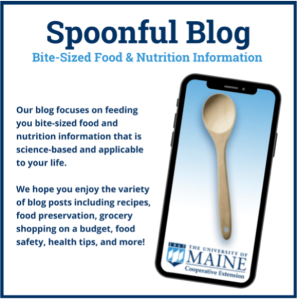
- EFNEP: Making a Difference in Maine
- In collaboration with members of the University of Maine Cooperative Extension Food Team, EFNEP staff helped contribute towards the creation of a new food and nutrition blog in 2021 called Spoonful.
The blog was developed to provide an additional method to reach and educate Maine people.
4-H Positive Youth Development
Program Highlights
4-H supports young people from elementary school through high school with programs designed to shape future leaders and innovators. Fueled by research-driven programming, 4-H’ers engage in hands-on learning activities in the areas of science, citizenship, and healthy living. Extension Professor Dr. Kristy Ouellette, and Community Education Assistant Cathy Gray work with youth, volunteers, teachers, and afterschool providers to strengthen and support the 4-H Youth Development program locally. 4-H Community Central Professional Laura Personette works specifically with the 4-H Community Central program in Lewiston. The 4-H Youth Development program in Androscoggin and Sagadahoc counties currently serves youth in both long-term and short-term club programs and school or community-based programs in both counties.
4-H Needs Assessment
Since the launch of his position in February 2022, Assistant Extension Professor Andrew Hudacs initiated a comprehensive statewide needs assessment of 4-H teen leadership and workforce development that includes collecting data through a statewide survey and meetings with colleagues and stakeholders. The preliminary results of the needs assessment indicate that there is a substantial portion of Maine teens who are not engaged in any out-of-school time structured activities. Furthermore, the program areas with the highest interest for development are in subjects of Marine or Aquatic Science, Sustainable Agriculture, Forestry & Natural Resources, and Neighborhood and Community Service.
Local Impacts 4-H Youth Development Has on Youth
- Since 2008, 93% (35) of 4-H teens who have graduated from high school have gone on to higher education. Teens reported the information learned through 4-H assisted them in being better prepared for college. Teens report the connection to the University of Maine as a component of the 4-H youth development program has influenced their decision to attend. Three 4-H alumni are currently attending UMaine System Schools. Four 4-H alumni have graduated from the University of Maine.
- All our long-term club program participants have completed at least two hours of community service. In 2022, 4-H members across the counties participated in the creation of birthday bags for Midcoast Hunger Prevention programs.
- 90% (135) of 4-H youth participated in programs focused on expanding Science life skills.
Local Program Achievements
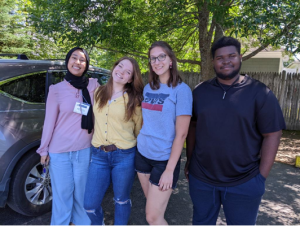
Androscoggin/Sagadahoc Teen Council: In 2021-2022 year, the Teen Council saw an increase of members from four to eight who were primarily recruited by Leader Association president, Jess Woodcock. The TC began a Future Business Leaders series whereby each teen member would work with a local business leader, present a workshop to the group together with their business partner, then take part in a networking event at the end of the series all planned by the teens.
County Public Speaking: In 2021-22 100% of our county participants qualified for the State public speaking tournament. These young people ranged in age from 10-18. They spoke on a variety of topics. Four were selected to represent the state of Maine at Eastern States Exposition.
A spotlight on food security: Feeding Phoenix/Award: Summit Woodcock, member of G.L.E.E. of Maine 4-H Club did her yearly project on food insecurity at her school. She raised awareness by speaking with her school advisor, principal, and school board members and requested to start an anonymous food pantry where students could get the food they needed without fear of embarrassment. Summit raised more than $500 to start the pantry. She presented her project at the Maine 4-H public speaking event and in addition, was nominated and won the Good Food Council of Lewiston-Auburn 2022 Youth Food Charter Champion Award.
STEM Ambassador / County 4-H partnership: And/Sag County 4-H partnered with Maine State STEM Ambassadors to provide computer science education to local youth in a 4-week series of workshops. Each youth who completed a modified project record received a completion pin at the end of the series. This opportunity was offered to non-4-H members to recruit new members in the county.
Maine 4-H Community Central
Community Central’s goal is to engage high school students from Lewiston and Portland in leadership opportunities, strengthen workforce and college/career readiness skills, and build social capital through programming offered at public housing, school, and community partner sites. The project is funded through a grant from the Children, Youth, and Families at Risk (CYFAR) Program through USDA/NIFA, and remains an initiative to connect schools, families, and communities through a “programming where the youth are” model.
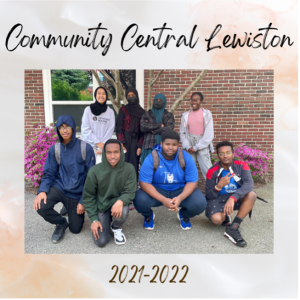 Teen 4-H clubs meet weekly with 4-H staff to participate in workshops that strengthen critical workforce skills. Through these learning and mentoring sessions, teens discover and connect with their sparks. “Sparks are what help youth see the potential within themselves. Sparking the inner passions, interests, and talents of young people that inspire them on the path to thriving is central to youth development work” (http://4h.ucanr.edu).
Teen 4-H clubs meet weekly with 4-H staff to participate in workshops that strengthen critical workforce skills. Through these learning and mentoring sessions, teens discover and connect with their sparks. “Sparks are what help youth see the potential within themselves. Sparking the inner passions, interests, and talents of young people that inspire them on the path to thriving is central to youth development work” (http://4h.ucanr.edu).
As a result of ongoing locally conducted needs assessments and economic policy from Educate Maine, 4-H staff identified six critical career vacancies, which are predicted for the state by 2032 (Educate Maine, 2018). There are four categories that the program is focusing on, with natural connections to local businesses and college pathways within the University of Maine System and are of interest to our teen populations:
- Teacher Preparation (UMaine 4-H Summer of Science)
- Maine Food Systems
- Community and Civic Engagement – including Legal
- Science, Technology, Engineering, and Math (STEM) – including Medical
Teens work with staff to identify areas of interest in the workforce and earn a stipend by participating in community-based learning experiences one to four times per year. Between 2019 and 2024, Community Central will reach 200 high-context participants (grades 8-12, ages 13-18) and 300 secondary participants (grades 3-6, ages 9-12). In Lewiston, Community Central membership doubled from the previous year.
In 2022 we further strengthened the partnership with 21st Century Learning Centers at Lewiston High School to continue programming in a central location. This powerful partnership continues to allow students to access 21st Century academic support and after-school snack/dinner, and eliminates a large barrier to participation through bus transportation availability. The ability to offer transportation allowed us to offer equitable access to the program. This strong partnership also supported 21st Century teens and staff as they navigated change in the form of a new program director and high school site coordinator in the span of two months. During this time 4-H remained a consistent support and outlet for teens.
Throughout the year participants earned stipends by participating in the focus area sessions. These sessions allowed teens to build relationships with program visitors, learn various pathways taken to current careers, explore occupations not previously known, and expand community connections and contacts. Several of these visits have resulted in youth joining volunteer training programs through local medical services and public-serving organizations to give back to their community and to further develop workforce skills through experiential learning.
Connect with us on Instagram: @4h.communitycentral.lewiston
4-H Summer of Science
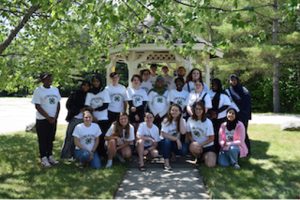
4-H Summer of Science exposes youth to informal science, technology, engineering, in a fun and meaningful way. It uses hands-on learning activities to mitigate summer learning loss and engage youth in science. 4-H Summer of Science brings STEM to communities all over the state of Maine, meeting kids where they are at.
In an effort to increase science proficiency for Maine youth and to prevent summer learning loss, UMaine Extension created, modified, and delivered science curricula at 12 community sites. Maine 4-H Summer of Science was held at free-or-reduced lunch sites, libraries, summer school programs, community youth providers, and summer camps. Funding through Maine EPSCOR, provides stipends to college interns in Androscoggin/Sagadahoc 4-H.
In 2022, our three interns were local 4-H alum! Interns oversaw teams of teens teachers in twelve sites in Androscoggin/Sagadahoc counties. 18 teens participated as teen teachers and 3 undergraduate interns supported this program.
The 2022 program was offered in Lewiston, Auburn, Sabattus, Livermore and Lisbon Falls, serving over 200 Androscoggin youth. 2022 4-H Summer of Science activities taught engineering, the scientific method, data collection and challenged youth to understand the role of environmental DNA.
4-H Virtual Learning
In response to the global pandemic, beginning in 2020, youth and educators were left struggling to find a way to connect with each other while remaining physically apart. Maine was no exception to this. Particularly in a state where broadband internet access is a challenge at the best of times, being thrust into remote learning was in many ways extremely challenging. Maine youth were left feeling isolated, alone, and without a sense of purpose. Three summers later, the landscape of virtual learning has changed and opportunities for new ways to gather, learn, collaborate and be part of the 4-H community have emerged.
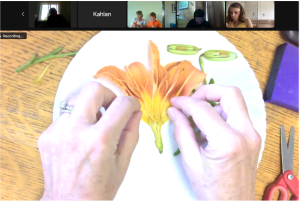
Maine 4-H offered the 4-H Summer Learning Series 2022, virtual programs for youth. Thirteen workshop topics were offered over the course of the summer. Many workshops were actually a series, and able to build upon learning and connection through multiple meeting times. Topics included pollination, citizen science, squid dissection, fiber arts, painting and more. An offline track was also offered, where activities were emailed weekly for young people to participate in their own time. Sessions were attended by 81 youth. Twenty-one percent participated in 3 or more workshops, coordinated by a team of 21 positive youth development mentors and guest presenters. Youth, families, and staff representing fourteen counties in Maine were involved in this series. Two-hundred and thirty-eight youth participated in virtual programs statewide. The virtual program reduced barriers and allowed for participants, presenters and staff to collaborate in new ways, allowing youth from all over the state to learn new skills and be part of 4-H.
Participants reported they enjoyed learning about new and different topics. Evaluation responses indicated that 100% of participants had fun and did something hands-on. Ninety percent indicated they explored an interest or discovered a new spark. They also reported that the experience was important because it encouraged them to share and learn about topics with other 4-Hers at the same time (90% learned a new skill), in a way that helped them feel part of a connected community (86% felt like they belonged). Youth shared gratitude for being connected to new friends. In particular, youth who participated in 3 or more workshops, often overlapped and were able to build relationships during multiple workshops and connect their learning between the sessions. For example, youth in Nature Journaling workshops would bring their journaling and observation skills to citizen science, and youth in citizen science would practice observation skills of bees and plants, which they connected to the pollinator series.
Parents shared “[my kids] continue to point out connections they see to what they learned through some workshops, to things we see in our everyday lives” and working parents said this helped with transportation so their children could participate. Most parents said that this gave their children something fun to look forward to each week.
Homemakers
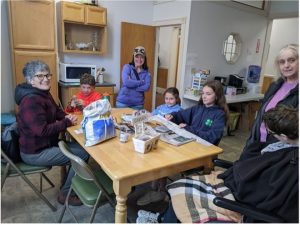
The Androscoggin Extension Homemakers Club has completed their first full year as a group and with great success. Named “Living Innovations Homemakers” and based at the Lisbon Extension office, the group meets monthly to learn a new skill, perform a community service, and enjoy the camaraderie of fellow members. Living Innovations is a 501(c)(3) that partners with families in Maine and surrounding states to “support people with intellectual and developmental disabilities to lead good lives at home and in their communities with innovative programming and services.” Though small, the group has seen some growth including members that are atypical of homemaker groups in other parts of our state.
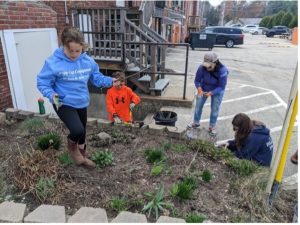
Recently, the Living Innovations group collaborated with 4-H members and a Master Gardener Volunteer to help with a beautification project around the Lisbon Extension office on Main Street. Bridging the gap between 4-H, Extension Homemakers, MGV, and neighboring counties will greatly impact outreach in Androscoggin County. In 2022, the group added two new members for a total of five and collaborated with two new Extension programs.
Community and Economic Development
Agriculture and Natural Resources
Farm Business Training
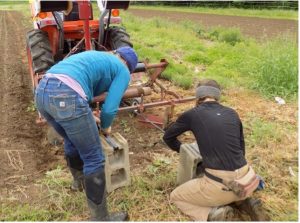 The So, You Want to Farm in Maine? (SYWTFIM) beginning farmer workshop series is offered annually. This multi-session course is designed for people who want to start a profitable farm business. The average cost for this 5-part series is just $100 per farm (sliding scale available) and successful completion of this course qualifies participants for USDA FSA (Farm Service Agency) Borrower Training Credit. The course covers topics including enterprise budgeting, cash flow projections, recordkeeping, business planning, insurance, taxes, & regulations. Since 2017, 411 new and beginning farmers have participated.
The So, You Want to Farm in Maine? (SYWTFIM) beginning farmer workshop series is offered annually. This multi-session course is designed for people who want to start a profitable farm business. The average cost for this 5-part series is just $100 per farm (sliding scale available) and successful completion of this course qualifies participants for USDA FSA (Farm Service Agency) Borrower Training Credit. The course covers topics including enterprise budgeting, cash flow projections, recordkeeping, business planning, insurance, taxes, & regulations. Since 2017, 411 new and beginning farmers have participated.
Farm businesses in Androscoggin and Sagadahoc Counties regularly access other Extension staff, including Food Safety, Livestock, Maple, Vegetable, Small Fruit and Tree Fruit Specialists who are based at Highmoor Farm in Monmouth or on campus in Orono.
Soil Health Outreach and Research: Enhancing Farm Sustainability and Water Quality
21 individuals received soil health and fertility recommendations to guide financially viable approaches for appropriate fertilization of crops while enhancing overall soil health. 153 people participated in workshops and conferences on this topic. These recommendations lead to reduced erosion and nutrient contamination to our watersheds. The Northeast Cover Crop Council Annual Conference was organized by our team and brought regional specialists, industry representatives and farmers to the region to discuss current research and approaches for enhancing soil health and therefore water quality.
Our program is leading research on interseeding soil protecting cover crops among late-season vegetable cash crops (right bottom). In addition to replicated research trials on a University of Maine research farm, we are collaborating with several farms in the county to trial this practice, troubleshoot logistical constraints, and modify readily available equipment to enhance adoption. All collaborating farms have increased the acreage that they are utilizing this practice on, this year over last. They have put time, effort, and funds into modifying equipment showing our team that they see real value in this practice. This is resulting in more acres of land protected over winter, stabilizing the soil, preventing erosion and nutrient loss to waterways (right top), and enhancing crop quality for these late-harvested crops.
Flowering in the North Conference for Flower Farmers in Cold Climates
Our team hosted the 5th annual conference for cut flower growers, with the 2022 program being held virtually. This is a rapidly growing industry in our area. 68 participants joined the 4-part program. Topics included season extension techniques and financial programs for supporting the adoption of season extension, post-harvest handling for crop quality, marketing of cut flowers, intricacies and options for varieties and species, and planning for successions throughout the season. There was an additional in-person session where cut flower producers met up to learn about the newly formed Maine Flower Collective. This is a new statewide flower marketing initiative, of which their development was largely supported by UMaine Extension through organization and grant acquisition and management.
The Maine Farm News
In 2022, 3,060 people subscribed to an online bi-weekly newsletter, the Maine Farm News. There are four contributing editors from UMaine Extension statewide, offering articles on timely topics, financial and grant programs, professional development opportunities and more for Maine farmers.
Master Gardener Volunteers
Volunteer Training
In the fall of 2022, we had 21 Master Gardener Volunteer Trainees begin their classes. Due to the later start of training, (October 2022 vs March in 2021) no new Master Gardener Volunteers graduated last year. The new class of trainees came from Androscoggin, Kennebec, and Sagadahoc counties nearly equally. They will become certified at the end of December 2023.
Volunteer Action
Due to the continuously changing nature of public interactions throughout the year, our projects fell into two distinct groups: In-person/Hands-on and Online Educational. In-person projects were generally on-site and outdoors at gardens, farms, or fields indoor projects. Educational trainings were generally virtual or asynchronous. The Home Garden Answer Team once again met virtually all year. The Plant Sale Map resource team was completely virtual as well. The Onion Project team met virtually for planning and in person for distribution.
Master Gardener Volunteers focused in the spring on individual projects including a seed sorting project, onion plant sorting and distribution, and writing articles for the Maine Home Garden News. Summer projects generally had a slow start due to weather issues. During the growing season, in-person volunteering was in the field with a focus on Harvest for Hunger food security work and other food projects in the community. In the fall, most volunteering was focused on maintenance of growing sites and preparation for the next year. Over 2,500 hours of volunteer work were done by Master Gardener Volunteers in 2022. Although MGVs volunteered over 3,000 hours in 2021, that included the 40 hours of volunteering for trainees from both 2019 and 2021, a total of over 900 hours. Comparing certified MGVs from 2021 to 2022 saw an increase of 500 hours or 25%.
Food Security
2022 was once again a very busy year in the area of Food Security. The Androscoggin Gleaners and the Merrymeeting Gleaners have volunteers in addition to Master Gardener Volunteers so both programs continued to operate throughout the year in collaboration with a network of food-focused organizations. Merrymeeting Gleaners also gleaned year-round once again. This program is housed within the larger Midcoast Hunger Prevention Program (MCHPP) with a full-time coordinator who is an employee of MCHPP. Through a Sewall Foundation grant the Androscoggin Gleaners hired a part-time Gleaning Coordinator in September and will continue glean up through the holiday season.
Statewide, 296,150 pounds of food were gleaned and donated through the Maine Harvest for Hunger Program in 2022, bringing the total since 2000 to over 3.636 million pounds of food. The combined total for Androscoggin and Sagadahoc counties was just over 57,400 pounds. Of note is that 2,275 pounds came from Master Gardener Volunteers and community gardens, with the rest coming from gleaning. The And/Sag group continues to have the highest total poundage for the state and is about 20% of the state total.
Both gleaning groups participated in other food security programs not reflected in the poundage total and servicing over 65 food-providing sites. These programs included the distribution of onion plants, seeds, and seedlings through local pantries in the spring as well as the distribution of garlic in the fall for planting. These hyper-local programs match available plants/seeds to community sites that are growing food as well as provide expertise if needed.
Community Gardens
Development of Community and School Gardens continues to be a growing trend. We currently support over a dozen community, library, or school garden projects. We have also strengthened our collaboration with ReTree Us, a non-profit organization that works with schools to grow orchards and fall gardens at schools throughout the state.
Bulk Onion Order and Bulk Seed Donation
The group onion order for projects throughout Androscoggin & Sagadahoc counties grew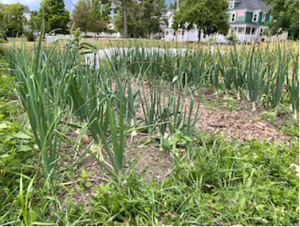 considerably in volume in 2022. In 2022, nine counties participated in the onion order as well as some Extension staff. Two order forms and two delivery dates were available. The first order form was for personal garden onion orders and pay-it-forward donations. The pay-it-forward donation option netted over $800 in donations. Our vendor also “comped” us one case of Leeks ($125 value) for just under $1,000 in donation value. We had 127 orders for people’s personal gardens.
considerably in volume in 2022. In 2022, nine counties participated in the onion order as well as some Extension staff. Two order forms and two delivery dates were available. The first order form was for personal garden onion orders and pay-it-forward donations. The pay-it-forward donation option netted over $800 in donations. Our vendor also “comped” us one case of Leeks ($125 value) for just under $1,000 in donation value. We had 127 orders for people’s personal gardens.
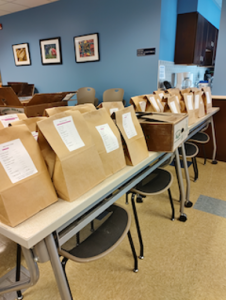 The second order was a “wish list order” for Harvest for Hunger projects.
The second order was a “wish list order” for Harvest for Hunger projects.
Through the generosity of Master Gardener Volunteer donations, we were able to cover all the project orders for free. We had nearly 50 project orders and covered 10 more projects once the orders placed were fulfilled by using any extras we had. Project orders are generally larger orders since they are for larger spaces like community gardens, school gardens, etc. so 39.24% of the plants we brought in were donated to projects.
In total, over 50,000 plants were ordered where 80% were onions and 20% were leeks/shallots. We were also able to clear about $300 “profit” which was about 10% of the money collected that went to the Androscoggin-Sagadahoc Counties Executive Committee (ASCEA) which underwrote this project. In 2023 the onion project went statewide and is now a part of the statewide Home Horticulture program. That would not have been possible without the generous support of the ASCEA.
Home Garden and Landscape
Each year, hundreds of home gardeners visit or contact the Androscoggin and Sagadahoc Counties Extension office via phone or email to ask questions about insect and plant identification, soil testing, and vegetable garden or landscape questions. We answered just under 200 such questions in 2022. Roughly 21% of these clients were from Sagadahoc County and 29% were from Androscoggin County. Additionally, we saw an uptick in the questions that come to us via the state “Ask the Expert”, social media and the internet where it is not always possible to know where the question originates. Our team works with plant pathologists, insect and disease specialists, and the tick lab in Orono to provide accurate identification and recommendations for clients with concerns about ticks, bedbugs, poisonous plants, and other potentially harmful pests. Some pests of note for our area include the Browntail Moth, jumping worms, and dog ticks. The primary process for asking and answering questions is via email with 69% of the questions being done that way followed by phone (17%) and phone and email (13%).
Community Impact
In 2022, MGVs worked on more than 50 projects in Androscoggin and Sagadahoc Counties, gleaning, educating children, low-income seniors, and many other members of the general population in the production of food crops and low-input gardening. MGVs in Androscoggin and Sagadahoc Counties contributed more than 2,500 hours during 2022. Based on the $31.80/hour value of volunteer time from the Independent Sector Estimate in April 2022, (the most recent figure available), the value of that time is over $79,500The value of the food donated in our counties was over $97,580 based on the 2022 value of $1.70 per pound. Our nearly 70 Master Gardener Volunteers had a measurable impact on our communities.

